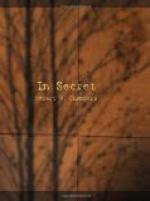“I know,” she said. And laid her other hand in his—a gesture of utter trust so exquisite that, for a moment, tears blinded him, and all the forest wavered grotesquely before his desperately fixed gaze. And presently, within the field of his vision, something moved—a man going westward among the trees his rifle slung over his shoulder. And there were others, too, plodding stolidly back toward the western forests of Les Errues—forms half-seen between trees, none near, and only two who passed within hearing, the trample of their heavy feet loud among the fallen leaves, their guttural voices distinct. And, as they swung westward, rifles slung, pipes alight, and with the air of surly hunters homeward bound after a successful kill, the hunted, lying close under their roof of branches, heard them boasting of their work and of the death their quarry had died—of their agony at the spring which drove them to that death in the depths of the awful gulf beyond.
“And that,” shouted one, stifling with laughter, “I should like to have seen. It is all I have to regret of this jagd-that I did not see the wilde die!”
The other Hun was less cheerful: “But what a pity to leave that roe-deer lying there. Such good meat poisoned! Schade, immer schade!—to leave good meat like that in the forest of Les Errues!”
CHAPTER XI
VIA MALA
The girl sat bolt upright on her bed of dead leaves, still confused by sleep, her ears ringing with the loud, hard voice which had awakened her to consciousness of pain and hunger once again.
Not ten feet from her, between where she lay under the branches of a fallen tree, and the edge of the precipice beyond, full in the morning sunlight stood two men in the dress of Swiss mountaineers.
One of them was reading aloud from a notebook in a slow, decisive, metallic voice; the other, swinging two dirty flags, signalled the message out across the world of mountains as it was read to him in that nasty, nasal Berlin dialect of a Prussian junker.
“In the Staubbach valley no traces of the bodies have been discovered,” continued the tall, square-shouldered reader in his deliberate voice; “It is absolutely necessary that the bodies of these two American secret agents, Kay McKay and Evelyn Erith, be discovered, and all their papers, personal property, and the clothing and accoutrements belonging to them be destroyed without the slightest trace remaining.
“It is ordered also that, when discovered, their bodies be burned and the ashes reduced to powder and sown broadcast through the forest.”
The voice stopped; the signaller whipped his dirty tattered flags in the sunlight for a few moments more, then ceased and stood stiffly at attention, his sun-dazzled gaze fixed on a far mountain slope where something glittered—perhaps a bit of mica, perhaps the mirror of a helio.




